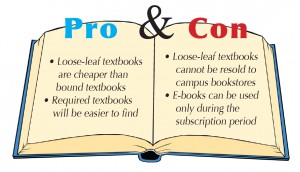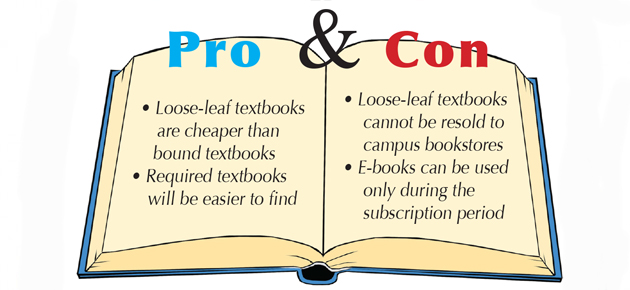By Rhiannon Saegert/managing editor

By 2016, all courses will transition to using a common textbook districtwide, starting with all core classes this semester.
The common textbooks’ initial run was rife with problems. Under Texas state law, instructors must post individual course requirements by the first day of enrollment. However, the books were delayed. Registration was delayed for a month, and some instructors still didn’t receive their texts until July 8, seven days before registration began.
Chancellor Erma Johnson Hadley said the goal of selecting a common textbook for each class was to lower the cost of books for students.
“We started out trying to save students money,” she said. “One big complaint we get from students on a constant basis is the price of textbooks.”
She said instructors usually negotiate the price of textbooks with publishing companies individually, leading to different textbooks and varying costs for the same course. Eventually, she said, every class will use a common textbook.
Moving all core classes to a common textbook had its hang-ups. Many teachers did not receive the new textbooks’ ISBN numbers until close to the beginning of the semester.
“It was pretty tight this time,” she said. “We absolutely will not have that same thing happen next time. We won’t have that issue with the next group.”
NE faculty association president and natural sciences professor Robert Edmonds said to call common textbooks unpopular among faculty is an understatement.
“The decision to have common textbooks started with the board of trustees, and it was passed down to faculty from the chancellor,” he said. “From a faculty standpoint, not all faculty were receptive to the idea.”
He said the delays at the start of the semester may be partially to blame.
“The rollout on this had issues,” he said. “There’s always going to be problems with something new.”
Instead of being run by the administration, the curricular committees now report to campus presidents.
“That’s a huge leap,” he said. “I think that’s more face to face.”
NE foreign language chair Mary Williams said she sees pros and cons to using a common textbook.
“I see that if you have different textbooks on different campuses where students take one semester at one campus and another semester at another campus,” Williams said, “that is not working for the students because they pay a lot for the textbook.”
Williams said this is especially a problem when the same book is used for multiple levels of the same subject.
“That means they’re buying a whole new textbook, buying the lab access and whatever the instructor’s using,” Williams said. “That’s where it seems we need to do something in order to keep students from being caught in that trap.”
She said instructors’ different teaching methods are bound to be an issue when it comes to choosing a textbook.
“They [instructors] don’t all agree on their approach to instruction, whether there’s going to be more speaking or more reading,” she said. “It’s hard for people to come together on that. Everything you do with your course is suddenly up for revision because we’re going with a different textbook.”
Williams said every individual class already follows a common syllabus, but specific course content is determined by each campus’ department. Having a common textbook will inherently limit their freedom to choose their content.
“If we move to a common textbook, I believe that ultimately people will figure out how to make it work for them and their students, but it’s hard to get everyone to change,” Williams said.
NE biology instructor Claudia Cash ran into a different problem.
“What I’m irritated with wasn’t the choice of book, it was the versions of the book,” she said.
Her preferred book, the one NE had adopted for its biology classes, was chosen as the districtwide common textbook. However, the school bookstore only ordered loose-leaf versions and e-book versions.
“They said I only have two choices, and I wanted neither, and I could not override that decision the college made,” she said. “I don’t like it. Yes, I was a part of it, and I’m glad we did it my way. But it did not reduce the cost to the students.”
She said even though the loose-leaf books and e-books are cheaper initially, there is no way to resell either.
“Because non-majors biology is a two-semester course and I wanted my students to have a hard-copy book for longevity,” she said. “All the bookstores know how fragile the loose-leafs are. What I object to is no one asked me if I thought a loose-leaf book was a legitimate purchase, and no one asked me about the e-book.”



























